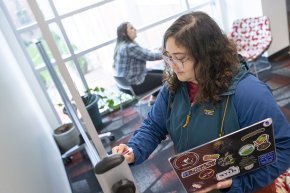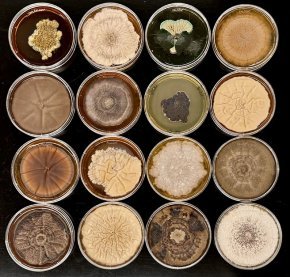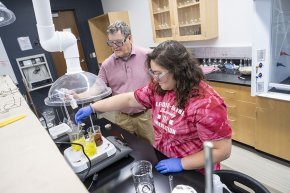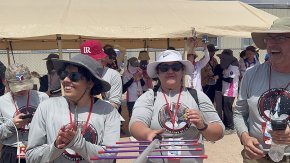
Finding beauty in unexpected places
Student research shows mold is captivating and beneficial under the microscope.
For most people, mold is a bad sign. It means food has gone bad or air quality is compromised. However, as a biochemistry major immersed in research, Christina Fisher ’25 sees mold in a different light.

“I want to work in pharmaceutical research/development, and I was trying to find a research topic to focus on. Dr. Grimm [Daniel Grimm, Ph. D., associate professor of biology] suggested I investigate the antimicrobial properties of fungi,” Fisher shared.
Fisher loved the idea and thought under the microscope, the images of growing molds looked beautiful. “Others might not feel the same way, but that is what drew me in. I like the whole idea of discovery and being able to find something that maybe hasn’t been done before,” she added.

Molds and other fungi have a long history as a source for antibiotics and other treatments – penicillin being the best-known example. Fisher’s research focuses on fungi that live within the leaves of invasive plant species. Her research this academic year has determined that these fungi do produce antimicrobial compounds. Next year she will continue the project by identifying these compounds in hopes of finding something new.
In March, the Appalachian College Association (ACA) awarded Fisher the Ledford Scholarship, which enables undergraduate students from any of the 20 ACA member institutions to work on significant research projects in any field. The scholarship will fund Fisher’s research through November 2024.
“I’ve had several friends who have been recipients in the past, so when I found out I was also a recipient, I was very excited to be able to have the extra means to continue my research. I’m also thrilled that this process has provided me with more opportunities,” Fisher shared.

In April, Fisher presented her research at the 120th Annual Meeting of the North Carolina Academy of Science. “So far, I have found 16 different molds that live inside of invasive plants that have the potential to stop the growth of disease-causing bacteria,” she explained. Her oral presentation of her findings won first place in the microbiology category.
This summer, Fisher will participate in North Carolina State University’s integrative microbial and plant systems (IMPS) research experience for undergraduates (REU). She will be working on a project observing microbes inside of plants and how they affect the plants’ health and behavior.
“I’m not surprised Christina has earned so many honors and achievements this year,” Grimm shared. “She has all the qualities of a successful researcher – creativity, persistence and an inquisitive mind. She asks a lot of ‘what if’ questions, which leads her to novel solutions to research challenges and new avenues of inquiry.”

In addition to her research, Fisher is immersed in campus life as a Bear of Distinction (BoD) for the Office of Admission as well as the ecological society SEEDS and the Balloon, Engineering and Rocketry (BEAR) Team.
“One of my favorite moments with the BEAR Team was participating in the Spaceport America Cup in New Mexico last summer,” said Fisher. “On April 8, the team traveled to Little Rock, Arkansas for the 2024 Solar Eclipse where we launched a balloon with several payloads, one of which photographed the Earth as the eclipse happened. It was a really exciting moment.”
News & Events

Spring 2026 events feature a conversation on “On Tyranny,” a Mardi Gras concert highlighting American composers and a panel discussion about what binds a nation.
View More
Lenoir-Rhyne, Emory & Henry, and Mars Hill will launch a pilot program to strengthen leadership, engagement, and persistence among male students across campuses.
View More